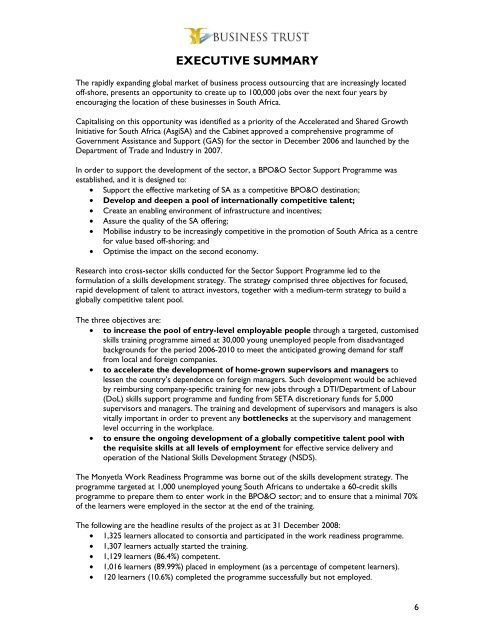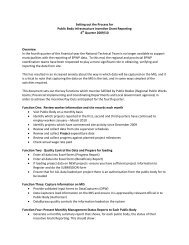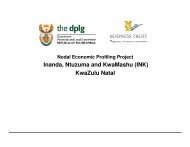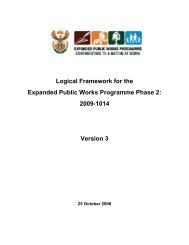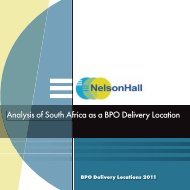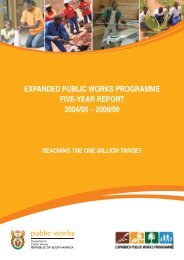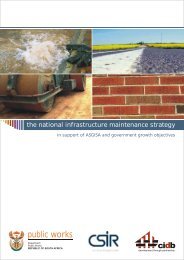Evaluation of the Monyetla Work Readiness ... - Business Trust
Evaluation of the Monyetla Work Readiness ... - Business Trust
Evaluation of the Monyetla Work Readiness ... - Business Trust
Create successful ePaper yourself
Turn your PDF publications into a flip-book with our unique Google optimized e-Paper software.
EXECUTIVE SUMMARYThe rapidly expanding global market <strong>of</strong> business process outsourcing that are increasingly located<strong>of</strong>f-shore, presents an opportunity to create up to 100,000 jobs over <strong>the</strong> next four years byencouraging <strong>the</strong> location <strong>of</strong> <strong>the</strong>se businesses in South Africa.Capitalising on this opportunity was identified as a priority <strong>of</strong> <strong>the</strong> Accelerated and Shared GrowthInitiative for South Africa (AsgiSA) and <strong>the</strong> Cabinet approved a comprehensive programme <strong>of</strong>Government Assistance and Support (GAS) for <strong>the</strong> sector in December 2006 and launched by <strong>the</strong>Department <strong>of</strong> Trade and Industry in 2007.In order to support <strong>the</strong> development <strong>of</strong> <strong>the</strong> sector, a BPO&O Sector Support Programme wasestablished, and it is designed to:• Support <strong>the</strong> effective marketing <strong>of</strong> SA as a competitive BPO&O destination;• Develop and deepen a pool <strong>of</strong> internationally competitive talent;• Create an enabling environment <strong>of</strong> infrastructure and incentives;• Assure <strong>the</strong> quality <strong>of</strong> <strong>the</strong> SA <strong>of</strong>fering;• Mobilise industry to be increasingly competitive in <strong>the</strong> promotion <strong>of</strong> South Africa as a centrefor value based <strong>of</strong>f-shoring; and• Optimise <strong>the</strong> impact on <strong>the</strong> second economy.Research into cross-sector skills conducted for <strong>the</strong> Sector Support Programme led to <strong>the</strong>formulation <strong>of</strong> a skills development strategy. The strategy comprised three objectives for focused,rapid development <strong>of</strong> talent to attract investors, toge<strong>the</strong>r with a medium-term strategy to build aglobally competitive talent pool.The three objectives are:• to increase <strong>the</strong> pool <strong>of</strong> entry-level employable people through a targeted, customisedskills training programme aimed at 30,000 young unemployed people from disadvantagedbackgrounds for <strong>the</strong> period 2006-2010 to meet <strong>the</strong> anticipated growing demand for stafffrom local and foreign companies.• to accelerate <strong>the</strong> development <strong>of</strong> home-grown supervisors and managers tolessen <strong>the</strong> country’s dependence on foreign managers. Such development would be achievedby reimbursing company-specific training for new jobs through a DTI/Department <strong>of</strong> Labour(DoL) skills support programme and funding from SETA discretionary funds for 5,000supervisors and managers. The training and development <strong>of</strong> supervisors and managers is alsovitally important in order to prevent any bottlenecks at <strong>the</strong> supervisory and managementlevel occurring in <strong>the</strong> workplace.• to ensure <strong>the</strong> ongoing development <strong>of</strong> a globally competitive talent pool with<strong>the</strong> requisite skills at all levels <strong>of</strong> employment for effective service delivery andoperation <strong>of</strong> <strong>the</strong> National Skills Development Strategy (NSDS).The <strong>Monyetla</strong> <strong>Work</strong> <strong>Readiness</strong> Programme was borne out <strong>of</strong> <strong>the</strong> skills development strategy. Theprogramme targeted at 1,000 unemployed young South Africans to undertake a 60-credit skillsprogramme to prepare <strong>the</strong>m to enter work in <strong>the</strong> BPO&O sector; and to ensure that a minimal 70%<strong>of</strong> <strong>the</strong> learners were employed in <strong>the</strong> sector at <strong>the</strong> end <strong>of</strong> <strong>the</strong> training.The following are <strong>the</strong> headline results <strong>of</strong> <strong>the</strong> project as at 31 December 2008:• 1,325 learners allocated to consortia and participated in <strong>the</strong> work readiness programme.• 1,307 learners actually started <strong>the</strong> training.• 1,129 learners (86.4%) competent.• 1,016 learners (89.99%) placed in employment (as a percentage <strong>of</strong> competent learners).• 120 learners (10.6%) completed <strong>the</strong> programme successfully but not employed.6


